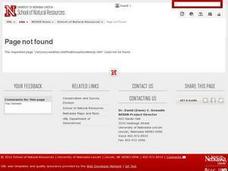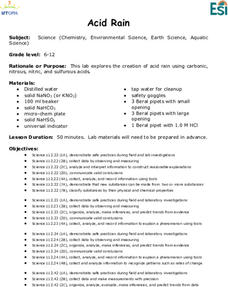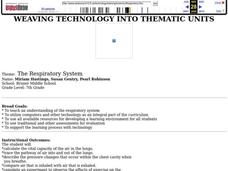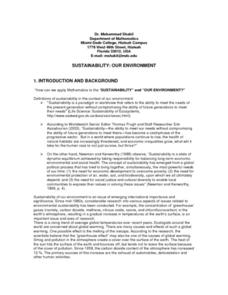Curated OER
Earth's Atmosphere and Temperature
Students explore the layers of earth's atmosphere and conduct an experiment to identify carbon dioxide. They construct models using styrofoam to represent molecules in the atmosphere's layers. To discover how sunlight efffects...
Curated OER
Straining out the Dirt
Students design and construct a water filter using activated carbon, cotton and other materials to remove chocolate powder from water. They test and record their observations, and complete a KWL chart.
Curated OER
Environment: Banana-in-a-Jar Experiment
Students conduct experiments using bananas sealed in jars to observe the effects on biodegradable waste in landfills. They cover the lid with a plastic sandwich bag to create an airtight seal. Students observe how the oxygen is used...
Curated OER
Changes in Nature
Fifth graders explore changes in nature. They identify chemical and physical changes in the water cycle, carbon cycle, and weathering. Students explore a chemical or physical change based on a chemical formula. They examine the effects...
Curated OER
Yeast Fermentation
Students measure the temperature change involved in the production of carbon dioxide by yeast. They also identify products and reactants in a chemical and balance the equation.
Curated OER
Respiratory System
Students analyze the function of the lungs. In this lesson about the Respiratory System, students explore breathing and the movement of air through the lungs. Students perform an 4 part experiment to observe what it might look like for...
Curated OER
Analogies
In this analogies worksheet, students complete the analogies about fuel, carbon dioxide, decay, and more. Students complete 10 analogies.
Curated OER
Experimenting with Yeast Metabolism
Ninth graders determine the rate of respiration by yeast and which sugars can be used as a food source by yeast using a CO2 gas sensor and computer software. This lesson plan is for an honors Biology class.
Curated OER
Off Base
Students study La Chatelier's principle and identify how carbon dioxide may affect pH. In this coral instructional activity students complete a worksheet on pH and observe a lab.
Curated OER
Acid Rain
Students create acid rain using carbonic, nitrous, nitric, and sulfurous acids.
Curated OER
Growing Coral
Students define the words coral and coral reef, and identify the Great Barrier Reef on a map or a globe. They observe crystal formations that develop in a way similar to the way coral polyps create their calcium carbonate cups.
Curated OER
Do Plants Eat?
Students explain that photosynthesis is a process that plants use to convert light energy into glucose. They summarize photosynthesis as a chemical process in which the plant uses carbon dioxide and water to form glucose and oxygen.
Curated OER
The Respiratory System
The student will calculate the vital capacity of the air in the lungs and trace the pathway of air into and out of the lungs. They describe the pressure changes that occur within the chest cavity when you breathe. They compare air that...
Curated OER
Earth Science - Earth's Atmosphere
Students build an understanding of the dynamics and composition of the atmosphere and its local and global processes influencing climate and air quality. They analyze global atmospheric changes including changes in CO2, CH4, and...
Curated OER
Structure-Property Relationships
Students explore the structure and property changes of water through videos and classroom discussion. They are introduced to atomic arrangement of solids by looking closely at carbon in different forms, such as graphite and diamond....
Curated OER
Sustainability: Our Environment
Students explore the sustainability of our environment, the trend in rising temperatures and the emission of greenhouse cases. Using given data, students test and construct a confidence interval and the difference between two population...
Curated OER
Type of Chemical Reactions: Single and double displacements
Students are taught that combustion of carbon in charcoal briquetts produces heat and light. They are shown how to find single displacement and double displacement. Students solve problem set of single and double displacement.
Curated OER
Breathing
In this breathing worksheet, students will review vocabulary words and topics relating to the lungs and the parts of the breathing system in humans. Students will explore how exercise effects the carbon dioxide that is exhaled. This...
Curated OER
Measuring Lung Volume and Capacity
In this measuring lung volume and capacity worksheet, students perform several experiments testing for exhaled carbon dioxide, measuring lung volume, and measuring lung capacity.
Curated OER
Dancing Raisins
In this science investigation worksheet, learners follow the directions to mix raisins in clear carbonated soda to watch them sink and rise.
Curated OER
Introduction to Earth's Dynamically Changing Climate
Students identify the most common causes of global warming. For this earth science lesson, students use an interactive website to explore changes over time in sea ice, sea level, carbon emissions, and average global temperature. They...
Curated OER
Liquids and Solids
Students describe the properties of solids and liquids, and explain how a semiconductor works. In this atom lesson students demonstrate the bonding properties of carbon and silicon.
Curated OER
Greenhouse Gasses
Learners study words in the news. They explore vocabulary including "climate change" and discuss its meanings and related meanings. They read a text about climate change and carbon dioxide emissions and answer questions. They complete...
Curated OER
How do plant & animal cells make and use energy?
Young scholars show the relationship between the need for plants to undergo photosynthesis in order to generate oxygen. They see the flaws associated with this thinking because of the lack of CO2 and H2O and lack of sufficient gravity in...























